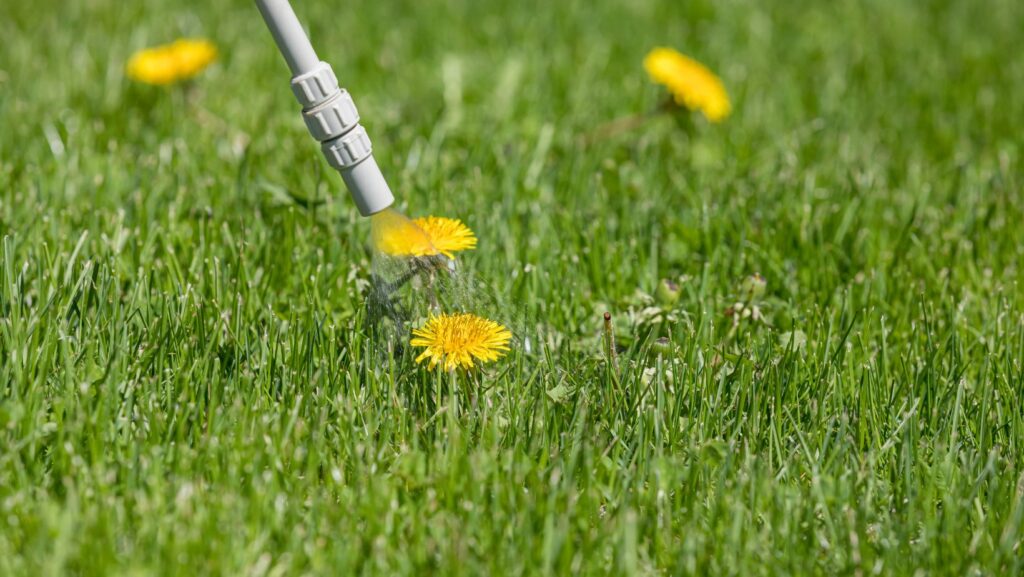 In the quest for a lush, weed-free garden, many turn to chemical solutions without considering their environmental impact. For example, herbicides like Roundup have proven themselves to be dangerous to humans and the environment alike.
In the quest for a lush, weed-free garden, many turn to chemical solutions without considering their environmental impact. For example, herbicides like Roundup have proven themselves to be dangerous to humans and the environment alike.
However, eco friendly weed killers offer a sustainable alternative that’s kind to the planet while keeping unwanted plants at bay. These green solutions are gaining traction among environmentally conscious gardeners and homeowners who seek effective weed control without compromising the health of their garden’s ecosystem.
Eco friendly weed killers leverage natural ingredients and mechanisms to combat weeds, reducing the reliance on harsh chemicals. They’re not only safer for the soil, water, and local wildlife but also for pets and children who enjoy spending time in outdoor spaces. As awareness grows about the importance of sustainable living, these green alternatives are becoming a go-to choice for maintaining beautiful, healthy gardens without the environmental downside.
Eco Friendly Weed Killer
 Reflecting the growing trend towards sustainable living, the discussion now turns to eco friendly weed killers. These green solutions are attracting attention for their ability to maintain a lush, weed-free garden without compromising the health of the environment, soil, water sources, wildlife, pets, and humans. In this section, the article delves into what qualifies a weed killer as eco friendly and explores the myriad benefits that these alternatives offer over conventional chemical weed killers.
Reflecting the growing trend towards sustainable living, the discussion now turns to eco friendly weed killers. These green solutions are attracting attention for their ability to maintain a lush, weed-free garden without compromising the health of the environment, soil, water sources, wildlife, pets, and humans. In this section, the article delves into what qualifies a weed killer as eco friendly and explores the myriad benefits that these alternatives offer over conventional chemical weed killers.
What Makes a Weed Killer Eco-Friendly?
Identifying a weed killer as eco-friendly hinges on several key factors. Primarily, it’s the composition that sets these solutions apart. Eco friendly weed killers use natural ingredients, such as vinegar, salt, essential oils (like clove, cinnamon, and citrus oils), or corn gluten meal, that target weeds without disrupting the surrounding ecosystem. Unlike their chemical counterparts, these substances break down quickly in the environment, minimizing any long-term ecological impact.
 Secondly, eco-friendly weed killers often employ physical or mechanical methods, including hand-pulling, mulching, or using tools like weed torches that eliminate the need for chemical intervention altogether. These methods prevent weed growth physically or destroy existing weeds without soil or water contamination.
Secondly, eco-friendly weed killers often employ physical or mechanical methods, including hand-pulling, mulching, or using tools like weed torches that eliminate the need for chemical intervention altogether. These methods prevent weed growth physically or destroy existing weeds without soil or water contamination.
Importantly, for a weed killer to be truly eco friendly, its production and packaging processes also matter. Manufacturers prioritizing sustainability use renewable resources and eco-conscious packaging materials to further reduce the carbon footprint of their products.
Benefits of Using Eco-Friendly Options
 Opting for eco-friendly weed killers offers a plethora of advantages, both immediate and long-term. Firstly, they ensure a safer environment for children and pets, who can be sensitive to the harsh chemicals found in traditional weed killers. Gardens, patios, and playgrounds treated with green solutions pose no harm, allowing for worry-free outdoor activities.
Opting for eco-friendly weed killers offers a plethora of advantages, both immediate and long-term. Firstly, they ensure a safer environment for children and pets, who can be sensitive to the harsh chemicals found in traditional weed killers. Gardens, patios, and playgrounds treated with green solutions pose no harm, allowing for worry-free outdoor activities.
Moreover, these eco friendly alternatives contribute significantly to water conservation efforts by eliminating the risk of chemical run-offs into local waterways. Such runoff can lead to algae blooms and adversely affect aquatic life, making green solutions a preferable choice for environmentally conscious individuals.
 In addition to protecting wildlife and beneficial insects, like bees and butterflies, eco friendly weed killers also protect the soil’s health. They prevent the buildup of harmful chemicals that can disrupt soil microbiology, ensuring a healthier garden ecosystem that promotes the growth of plants and maintains soil fertility.
In addition to protecting wildlife and beneficial insects, like bees and butterflies, eco friendly weed killers also protect the soil’s health. They prevent the buildup of harmful chemicals that can disrupt soil microbiology, ensuring a healthier garden ecosystem that promotes the growth of plants and maintains soil fertility.
Lastly, using eco-friendly weed killers aligns with the broader goal of sustainable living, helping individuals and communities reduce their environmental footprint. Through the careful selection of weed management products, gardeners play a crucial role in fostering a safer, healthier planet for future generations.
Types of Eco Friendly Weed Killers Available
Following the shift towards more sustainable gardening practices, eco friendly weed killers have emerged as a pivotal component of maintaining a healthy, weed-free garden without harming the environment. This section delves into the various types of eco friendly weed killers, focusing on their natural ingredients and DIY recipes that meet the increasing demand for green solutions.
How to Effectively Use Eco-Friendly Weed Killers
Application Tips for Best Results
Eco-friendly weed killers, highlighted for their minimal environmental impact and safety for both wildlife and humans, require specific application techniques for optimal efficacy. When using solutions like vinegar-based sprays or corn gluten meal, timing and precision are critical. For liquid eco-friendly herbicides, applying during the full sun ensures the solution dries quickly, enhancing its effectiveness. Conversely, corn gluten meal, a pre-emergent, works best when applied in early spring before weed seeds germinate.
 Accuracy in targeting weeds, without affecting nearby desirable plants, is crucial. Using a spray shield or applying the solution with a brush can prevent unintended damage to neighboring flora. Moreover, repeated applications may be necessary; eco friendly options typically don’t offer the single-application convenience of chemical herbicides but are safer for repeated use.
Accuracy in targeting weeds, without affecting nearby desirable plants, is crucial. Using a spray shield or applying the solution with a brush can prevent unintended damage to neighboring flora. Moreover, repeated applications may be necessary; eco friendly options typically don’t offer the single-application convenience of chemical herbicides but are safer for repeated use.
Watering the area a day before application can also improve results. Moist soil allows the eco friendly weed killer to adhere better and penetrate the root system of weeds more effectively. Understanding the specific application instructions for the chosen product maximizes its potential, aligning with eco-conscious gardening practices.
Common Mistakes to Avoid
While employing eco-friendly weed killers, gardeners occasionally encounter pitfalls that can reduce their success. One common mistake is applying herbicides on windy days, which can disperse the product away from targeted weeds, reducing potency and potentially harming other plants or animals. Equally, using too much product can harm the soil and non-target plant life; eco-friendly does not mean without effect, and overuse can lead to soil desiccation or toxicity.
 Neglecting to read and follow the specific instructions provided with eco-friendly products can lead to ineffective weed control. Each product, whether commercial or homemade, comes with recommendations for use, including the best time of day for application, whether the product should be applied to wet or dry plants, and the necessary safety precautions.
Neglecting to read and follow the specific instructions provided with eco-friendly products can lead to ineffective weed control. Each product, whether commercial or homemade, comes with recommendations for use, including the best time of day for application, whether the product should be applied to wet or dry plants, and the necessary safety precautions.
Lastly, assuming all eco-friendly weed killers work for every type of weed is another misstep. Certain natural ingredients target specific weed varieties more effectively. For example, acidic solutions like vinegar may work well on young, annual weeds but struggle against perennials with deep root systems. Tailoring the approach to match the weed type and its growth stage ensures the efficient use of eco-friendly weed control methods.
Integrating Eco Friendly Weed Killers Into a Garden Management Plan
Incorporating eco friendly weed killers into a garden management plan requires more than just substituting synthetic chemicals with natural alternatives. It involves a comprehensive strategy that combines the timing, frequency, and methods of application with sustainable gardening practices. This approach not only controls weeds but also supports the ecosystem.
Companion Planting and Other Natural Weed Control Methods
 Companion planting stands out as a strategic method in the arsenal against weeds, leveraging the natural relationships between plants to suppress weed growth. For instance, planting clovers can outcompete common weeds by covering the ground quickly, providing the added benefit of fixing nitrogen in the soil, which supports neighboring plants. Similarly, tall plants can offer shade to the soil, reducing the germination rate of weed seeds due to the lack of sunlight.
Companion planting stands out as a strategic method in the arsenal against weeds, leveraging the natural relationships between plants to suppress weed growth. For instance, planting clovers can outcompete common weeds by covering the ground quickly, providing the added benefit of fixing nitrogen in the soil, which supports neighboring plants. Similarly, tall plants can offer shade to the soil, reducing the germination rate of weed seeds due to the lack of sunlight.
In addition to companion planting, other natural weed control methods play a crucial role in an eco-friendly garden management plan. Mulching with organic materials like straw, wood chips, or grass clippings can effectively block light from reaching weed seeds, thus preventing their growth. Furthermore, mulch retains soil moisture, adds nutrients as it decomposes, and keeps the soil temperature regulated.
Timing and Frequency of Application
 The timing and frequency of applying eco friendly weed killers are critical factors in ensuring their effectiveness without harming the environment. For instance, applying vinegar-based solutions should be done during full sunlight when the weather is dry; this ensures the acid in the vinegar desiccates the weed leaves more effectively. Corn gluten meal, a pre-emergent weed control, is most effective when applied in early spring before weed seeds begin to germinate.
The timing and frequency of applying eco friendly weed killers are critical factors in ensuring their effectiveness without harming the environment. For instance, applying vinegar-based solutions should be done during full sunlight when the weather is dry; this ensures the acid in the vinegar desiccates the weed leaves more effectively. Corn gluten meal, a pre-emergent weed control, is most effective when applied in early spring before weed seeds begin to germinate.
Regular monitoring is essential to determine the right frequency of application for eco-friendly weed killers. Some natural solutions may require multiple applications to achieve the desired effect, depending on the weed species and the growing conditions. Gardeners should aim for the minimal effective frequency that manages weed growth while minimizing any potential impact on the surrounding plants and wildlife.

